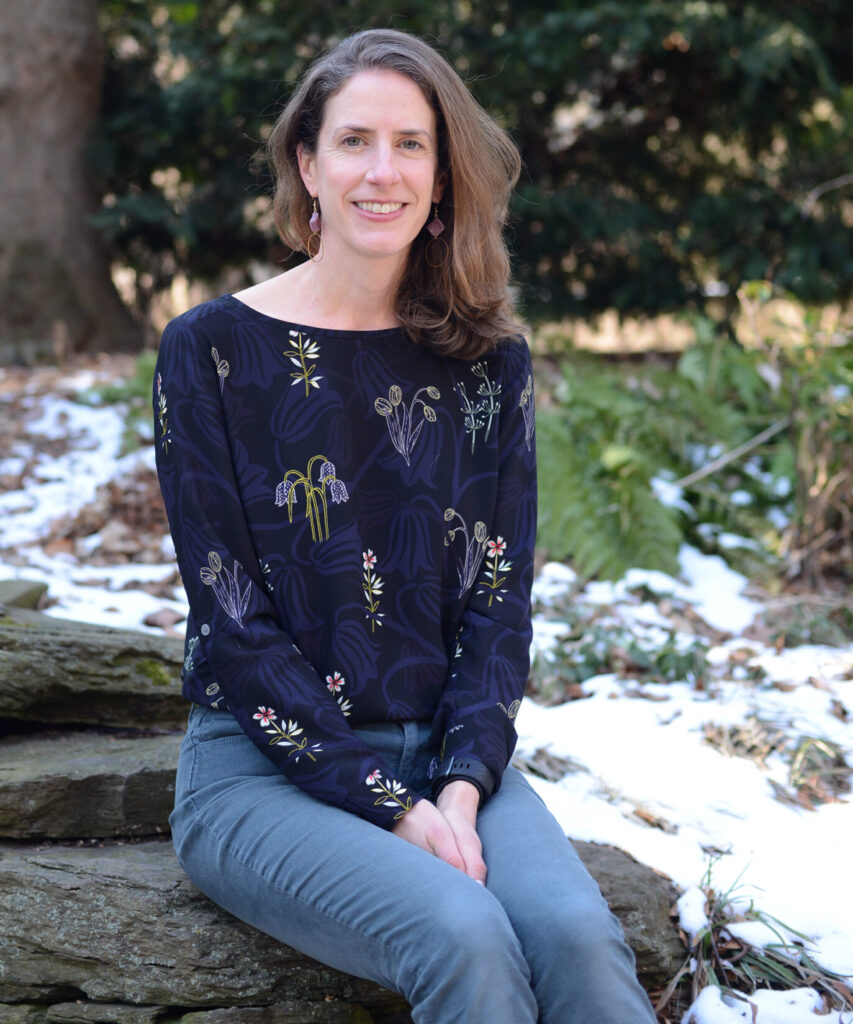
Katie Baillie serves as the director of the Environmental Innovations Initiative at the University of Pennsylvania, where she works at the intersection of research, communication, and community impact. With a background in biology, science writing, and environmental studies, Baillie brings a unique perspective to bridging academia and civic life. In this interview, she shares her journey, her approach to sustainability, and her advice for students and STEM professionals interested in making a difference.
ESAL: Could you share a bit about your background and what led you to your current role today?
Katie Baillie: I’m currently the director of the Environmental Innovations Initiative at Penn, and I’ve been here for two years. But I’ve actually been at Penn for almost 14 years. Before this, I worked in the University Communications office as a science communicator and writer.
I majored in biology because I was fascinated by the natural world. After college, I worked in a molecular conservation genetics lab and realized I was most excited about telling the story of what we found — what it meant and what should happen next.
That realization led me to get a master’s in science writing, and I worked in journalism and communications roles before coming to Penn. While working here, I reconnected with environmental studies through coursework and completed a master’s in environmental studies in 2022. That reignited my interest and brought me to my current role, where I focus on understanding what drives people and connecting research to real-world action. It’s about advancing a shared mission, not just within Penn but across Philadelphia and beyond.
ESAL: How do you personally define sustainability?
Baillie: At its core, sustainability is about operating in a way that doesn’t harm future generations. But I see it as a holistic, people-focused concept.
It’s not just about keeping the earth clean. It’s about all the systems that support our lives: food, energy, goods, and communities. Even small changes require intentionality. For example, shopping in the bulk section with reusable containers takes planning and extra steps.
Systems often make it difficult to make sustainable choices. In Philadelphia, for example, there is no citywide composting, so you have to manage it yourself or pay for a service. Beyond individual choices, we have to think about policy and systemic incentives for companies and communities.
ESAL: How does your work at Penn support these broader sustainability issues?
Baillie: My work is on the academic and educational side rather than operational sustainability. I support researchers and students in integrating climate and sustainability into their studies and research.
My focus is on creating opportunities for cross-disciplinary conversations and encouraging students to see where their interests intersect with sustainability. For instance, my office runs Climate Week at Penn, which is a weeklong series of events that raise awareness about the climate crisis and highlight how every discipline can contribute.
ESAL: If you had to distill your work into one guiding principle, what would it be?

Baillie: Everyone has a part to play in addressing the climate crisis, and every discipline is relevant.
At Penn, we work with all 12 schools — from business to veterinary medicine — to help them think about how their courses and research can engage with and contribute to solving climate and environmental challenges. The message I emphasize is that no one is exempt; we all have something valuable to contribute.
ESAL: How do you draw on historical legacies or past crises in your approach?
Baillie: I often think about the COVID-19 pandemic as a model for rapid, collective action. Researchers, public health officials, policymakers and ethicists all came together to create and distribute vaccines.
In my role as a communicator, I’ve been inspired by Rachel Carson’s Silent Spring, which showed how environmental issues directly affect people’s lives and, in doing so, catalyzed action. Today, we need to stay focused on identifying and implementing solutions rather than debating whether the crisis exists. Past moments like these show us that coordinated action is possible.
ESAL: During initiatives like Climate Week, have you encountered any surprising misconceptions?
Baillie: A common misconception is that we don’t know what to do about the climate crisis. In reality, we know many of the steps; it’s about having the will to act.
We have faculty at Penn working on decarbonization strategies, sustainable building materials, and regenerative agriculture — these solutions are close to being deployable at scale but need infrastructure and support.
Ayana Elizabeth Johnson’s book What If We Get It Right? encourages us to imagine a hopeful future, which can be more motivating than focusing on guilt.
ESAL: What has been the biggest challenge in your work?
Baillie: The biggest challenge is bringing together people from different backgrounds and finding common ground. It can be tough, but it also leads to the most impactful ideas.
Creating spaces where people feel comfortable sharing and seeing how their work fits into a larger effort is key.
ESAL: How has this journey affected you personally?
Baillie: It’s reinforced my belief in the power of collective action. The most meaningful changes often start small and ripple outward.
I’ve also learned the importance of optimism and storytelling. People respond to hopeful visions of the future.
ESAL: What advice would you give to STEM professionals or students interested in civic and environmental issues?
Baillie: Start small and stay curious. Take a class, join a local group or talk to people outside your field. An engineering student might try a course on biofuels or sustainable transportation.
Beyond classes, share what you learn with friends. Peer influence is powerful. Write an op-ed, start a campus project or engage with community partners.
Students have strong voices on campus, and leaders listen closely to them. At Penn, we convene a student committee to advise us because their perspectives are critical.
Use resources around you to build knowledge and connections. Your voice matters, and every discipline has something to contribute. The key is to get involved and keep going.
“Everyone has a part to play in addressing the climate crisis, and every discipline is relevant… No one is exempt — we all have something valuable to contribute.” — Katie Baillie
Learn More
To learn more about the Environmental Innovations Initiative at Penn, visit their website.
Do you have a story to tell about your own local engagement or of someone you know? Please submit your idea here , and we will help you develop and share your story for our series.